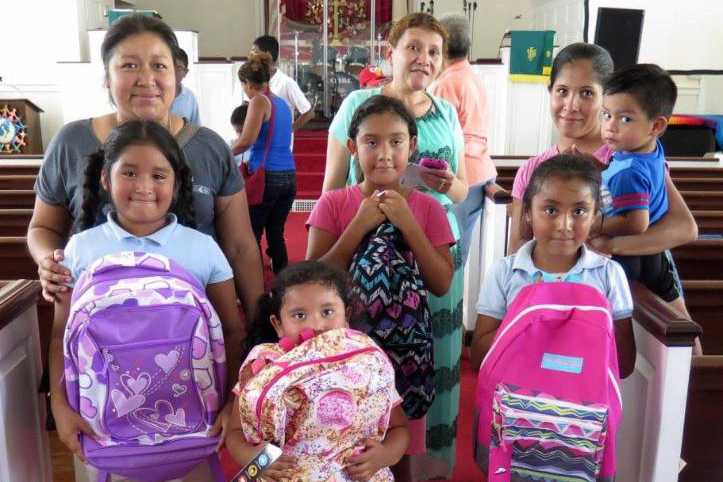Ephesians 1:15-23
David A. Davis
September 11, 2016
September 11, 2001, was a Tuesday. That first Sunday after, September 16, of course we were in here for worship. I wrote about that remarkable Lord’s Day worship years ago and I described it like this: “It looked like Easter morning at the church that Sunday. There were no extra flowers but the pews were packed. People went looking for a church that morning. It was like Easter without the trumpets. Joy was nowhere to be found. The events of the Tuesday before turned that Lord’s Day into something like the dark side of Easter, not quite the antithesis of Easter. But it was Good Friday content with Easter Sunday crowds.” People weren’t just looking for a church, they were searching for some comfort, looking for a place to weep, trying to make some sense, find some sense where there was none to be found. Nobody came for answers, they came to pray, to be together, to remember, to try to sing, and to be anointed within by the very tears of God. September 16, 2001, we came here searching with our hearts, looking with our hearts, the eyes of our hearts.
So when the Apostle Paul gifts the reader of Ephesians chapter one with the poetic image of “the eyes of the heart” — I pray that the God of our Lord Jesus Christ, the Father of glory, may give you a spirit of wisdom and revelation as you come to know God, so that, with the eyes of your heart enlightened, you may know what is the hope to which God has called you – when Paul writes about “the eyes of your heart,” you don’t have to be a biblical scholar to grasp, to get, to sort of know deep down what it means — that your heart has eyes.
Ephesians 1:18 is the only time the expression appears in scripture. The eyes of your heart. For some the notion of a heart with eyes, that wisdom and revelation and enlightening would be a matter of the heart rather than the mind must be unsettling. The King James translates it “the eyes of your understanding being enlightened.” Another contemporary translation puts it like this, “May God enlighten the eyes of your mind.” One New Testament scholar offers his own translation in his commentary: “May your spiritual eyesight be enlightened.” Spiritual eyesight? Really? You don’t have to know Greek to read opthalmous and cardias in the passage. It is the eyes of your heart. Eyes and heart. Perhaps Professor Clifton Black puts it best, “so that the eyes of your heart may light up.”
“I pray that the God of our Lord Jesus Christ, the Father of glory, may give you a spirit of wisdom and revelation as you come to know God, so that, as the eyes of your heart light up, you may know what is the hope to which God has called you, what are the riches of God’s glorious inheritance among the saints, and what is the immeasurable greatness of God’s power for us who believe, according to the working of God’s great power.” That you may know, with the eyes of your heart, God’s hope, God’s glory, God’s power. God put this power to work in Christ when God raised him from the dead and seated him at his right hand in the heavenly places, far above all rule and authority and power and dominion, and above every name that is named, not only in this age but also in the age to come. Paul’s just singing now. It’s a hymn here in Ephesians chapter 1. Just like Colossians — He is the image of the invisible God, the firstborn of all creation. Just like Philippians — therefore God has highly exalted him and gave him the name that is above every name. In the middle of the Apostle’s prayer for the faithful at Ephesus, in the middle of his pastor prayer, as he prays for their hearts to have eyes, he starts to sing the doxology.
And God has put all things under Christ’s feet and has made Christ the head over all things for the church, which is Christ’s body, the fullness of Christ, who fills all in all. The last line in the hymn of praise. Christ’s feet, Christ’s head, Christ’s body. As one commentator puts it, Christ who is over the church is also in it and fills it. The fullness of God resides in him, and from him the Body of Christ is constantly supplied with and by Christ’s presence. As Professor Black puts its, “Christians [as the body of Christ] are conduits of Christ’s immeasurably redemptive power: the church is the very body of his fullness that fills all things with loving goodness.”
The church as Christ body bearing the fullness of his love to the world. Even as Paul breaks into song, his prayer for the body of Christ continues. Yes, it’s doxology but it’s also discipleship. His song, his prayer, is praise and it is praxis. Singing, praying, promising that the body of Christ would carry his fullness into the world. When the eyes of your heart light up with God’s hope, God’s glory, God’s power, according to Paul, as the follower of Christ so transformed by his fullness, how can you not turn and baptize the world with his grace and mercy. The fullness of him who fills all in all. Christ alone is head of the church and he also fills it. It is one thing to give up on trying to wrap your head around the world and its seemingly never-ending chaos, but with the eyes of your heart enlightened, you can still give a witness to the wonders of his love, you can still pass forward the selflessness of his compassion, you can still bear his light every day in your corner of life. It’s the discipleship in doxology, knowing that when it comes to God’s hope, God’s glory, God’s power, and the very fullness of Christ, you and I actually have a part to play.
Just this week I was taking my dog out for a walk on what was yet another sweltering early evening. I ran into one of our next-door neighbors. I hadn’t seen him since we had returned after being out of the country for two months. It was clear right away he didn’t know we had been gone. After I told him, he said, “So you have missed this unbearable summer.” I thought he was talking about current events, the news, all that has been going on since I have been away from you. He was actually talking about the weather, the heat, the humidity. When the confusion became clear to both of us, he responded with a wave of his hand and a wipe of his brow, “Ah, the news, we will always have the news,” he sighed. His was a tone of resignation, even detachment. Maybe that was his only means of coping with the sweltering tensions and the tragic grief and the terror unleashed and the disheartening partisanship of the summer of 2016. At some point this summer I imagined standing before you on this morning and making a lighthearted reference about “not much going on while I was away.” The problem, of course, is that there is absolutely nothing lighthearted about it, about any of it.
Some will know that one of Nassau’s members, Dave Kershner, was in charge of the development of the One World Observatory that now stands at the top of One World Trade Center. The exhibit begins in the lobby of that skyscraper as you pass through video presentations of those who built the new building and you see displays of the rock foundation upon which the structure was built. In the moving voices and tears of architects and iron-workers and carpenters, a visitor can’t miss the symbolism of strength, determination, honor, spirit, hope, and life rising out of despair and death, one person, one heart, one voice, one life at a time. Of the many, many things the fifteenth anniversary of September 11, 2001, means for us, and for families that still grieve, and for this nation, and for the world, maybe one piece is that today can also serve to lend a perspective to the oppressive summer of 2016, that from a firm foundation new understandings can arise and that hope can still rise out of despair and that unity among our leaders doesn’t have to be lost forever.
When I think back to this summer of reading the news and being so far away from you, it wasn’t the preaching that I missed. I preached the whole month of July in Scotland. Honestly, some of those other Sundays I was quite relieved to not have to stand up here and offer a gospel word. “Ah, the news, we will always have the news.” For the Christian, that resignation, that detachment, that defeatism in the face of the world’s darkness isn’t really an option… Because of the fullness of Christ and his promise that our hearts would see his light, that the darkness shall never overcome that light, that our hearts would see our salvation, which God has prepared in the presence of all people, that our hearts would see the very face of Jesus in hungry, the thirsty, the stranger, the naked, the sick, the imprisoned, that our hearts would see what the Apostle Paul called “a more excellent way”.
What I missed this summer was you and I putting our hearts together, searching, looking, with the eyes of our hearts. Because God has promised us that Christ is here above us, here with us, here within us, in all of his fullness. And that we, the Body of Christ, shall always be anointed, comforted, fed, and sent by that same fullness. That the eyes of our hearts will light up with God’s hope, God’s glory, God’s power. It’s not just that God has promised us; it’s that we’ve experienced it. Over and over again. Right here, when we are together, in worship, in this place.
One Sunday after worship in one of the congregations I served this summer, a big burly man came up to me. He had a wonderful flow of white hair, a beard, and this weather-worn red face. He had to be either a sea captain or Santa Claus. He took both my hands in his and as he thanked me for the service, for the sermon, he said, “Now could you please just talk slower and use less words. You’re American, you know.” Then he got teary and with his voice breaking, he said, “There’s just so much there, you have to give us time to take it all in.” He wasn’t talking just about the sermon, of course. He was talking about the gospel. He was talking about God’s grace. He was talking about the fullness of Christ. God’s hope. God’s glory. God’s power. And one man’s yearning for the eyes of his heart to light up again and again and again.
© 2016 Nassau Presbyterian Church
Contact the church to obtain reprint permission.


